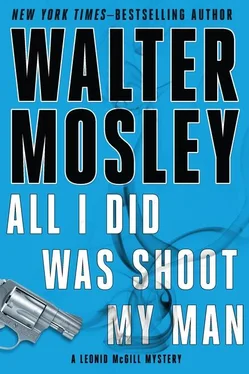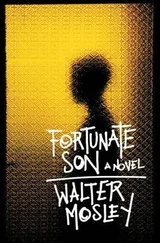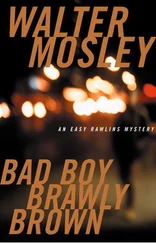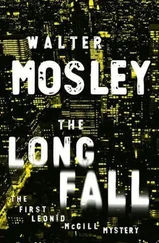“Why not?”
“Because even though his parents think that he’s an innocent nerd I have some reservations. I don’t want him thinking about you too closely.”
“Lotsa people know me. You know that, Pops. If I use a fake name and he knows it, that’ll be all the worse.”
“Just do what I say, Junior.”
“Okay, you got it. That Mirabelle’s cute anyway.”
“This is business, son — not pleasure.”
“And I am on the job,” he said, exhibiting a boyish smile.
After that Twill and I reverted to our roles in the modern world: we started checking our cell phones for texts, forwarded e-mails, and voice messages.
I had five voice mails and two texts. They were all from people I knew: Breland Lewis of course, Zella Grisham, Zephyra Ximenez, Carson Kitteridge, and Gordo Tallman — the most important man in my life.
“Hey, LT,” Breland said. “I heard from Shelby that you were a little hard on them. He said that some guy named Mathers and their daughter are supposed to get together with his son. He’s uncomfortable about getting her too deeply involved, but I told him that you were the best and that you wouldn’t put anyone in danger. Don’t make me a liar, okay?
“About that other thing — Jeanette looked up the adoption papers for Baby Grisham and found that she was taken in by Sidney and Rhianon Quick of Queens. I’ve texted you the particulars.
“Zella called the office when I was in a meeting. I haven’t talked to her yet, but it sounds like she’s in some kind of trouble already.”
The next message was from Zella.
“Mr. McGill, I know I keep calling you with my problems but I’m just telling you something this time. I tried Mr. Lewis but he’s been in meetings all day, and I thought he’d like to know that this woman, from Rutgers Assurance, came to the place he got me the job and then they told me that they had to let me go. The woman’s name was Antoinette Lowry and she told the floor supervisor that the police would be involved.
“When I got home Ms. Deharain told me that Lowry had been there too. I thought that she’d kick me out, but she told me that you and her went way back and it would take more than a corporation’s private security force to scare her.
“That made me wonder. I thought that it was Mr. Lewis who was helping me, Mr. McGill — not you.”
We were moving through heavy traffic on First Avenue. I put the phone down a moment, worrying about the choices I made while under the influence of the fever.
Mary Deharain was a client from the old days. I’d gotten her husband arrested for a murder that he did commit. Living on her own and lamenting the hard choice she’d made to have her insane husband sent to prison, Mary ran a boardinghouse for folks who liked to live under the radar.
I’d lodged a lot of clients there. But that wasn’t such a great idea if I didn’t want the client to know that I was looking out for them...
“... No Harry Tangelo,” Zephyra said in her message. “No Minnie Lesser either. Harry disappeared before his wife’s trial. He was an orphan so there’s no family. The funny thing was that Minnie’s mother, Teresa Lesser, was easy to find. She lives in the Bronx. I ran a check on any missing persons reports on both Tangelo and Lesser. Nothing there either. I’ll send you a text with Minnie’s mother’s information and anything else I found.”
... and curiouser.
“I need to have a meeting with you, LT,” was captain-at-large Carson Kitteridge’s single-sentence message.
Kitteridge had studied me over the years. He was my own personal Inspector Javert — intent on making my life miserable. I imagined him rooting around in my trash and going to judges to get wiretapping writs.
Funny thing about a nemesis, however, is that while they’re studying you you learn all kinds of things about them. I knew what Kit was looking for by the tone in his voice and words he used.
For instance: Carson only ever used the word need when there was a third party involved. He only asked for a meeting when the crime I was suspected of being involved in was more important than putting my ass in stir. If I was in trouble, he’d just tell me to come down to his office — no ifs, ands, or buts.
And so, from that single sentence, I knew that there was some cop or team somewhere investigating the Rutgers heist and they wanted to talk to me.
“Hey, kid,” Gordo Tallman, one of the great unsung boxing trainers of this century and the last, said. “I got me a problem that’s your fault even though I can’t be mad at you for causin’ it. Make sure you get down here soon.”
I knew Kit because you had to be able to read a predator’s signs. But I understood Gordo because I loved him, because he took me into his gym and taught me the right hook/left uppercut combination while everybody else was telling me that I shouldn’t be angry for my father abandoning us, leaving my mother to die from a broken heart.
I disconnected from the voice mail system and noticed that I’d gotten another text while I was listening.
This message was from Aura Ullman.
Before reading what she had to say I sent a text of my own, to Gordo.
I be by in a few hours, G, just have to do one thing first.
Call me, was all Aura’s message said. Two words that meant more than anything else that had been said that day.
A few minutes later the cab pulled up in front of the Tesla Building. I was still thinking about my messages and how they formed the pattern of my day.
“Pops,” Twill said.
“You get out of here,” I told him. “Go up to the office and tell Mardi to give you two hundred dollars out of petty cash. Use it for the pizza and anything else you might need.”
“What about you?”
“I got places to be.”
I gave the driver a Wall Street address and sat back while he put up a tactical offense against the midday traffic.
As he struggled silently I thought about Aura.
We hadn’t seen much of each other in the last half year. I was pretty sure that she was using a private entrance to the building and taking the freight elevator to avoid running into me.
We loved each other, but I was married and living a life that seemed hell-bent on destruction. Aura could have handled either situation, but dealing with both was just too much for her.
I tried to decipher her message but found that it was beyond my abilities and so I took two more aspirin, sat back, and started counting my breaths until reaching ten, at which point I started the count over again.
“Mister?” the small brown-skinned cabbie said.
I’d been sound asleep in the back of the cab. It was an animal nap — dreamless and broad.
The entire first floor of the block-long office building comprised the Rutgers Assurance security system. First there was a desk where you made your bid for admission.
I started out by asking to speak with Antoinette Lowry. When asked the nature of my business I let it drop that I represented a woman named Zella Grisham. This proposal, along with a state-issued picture ID, caused the visitors’ turnstile to unlock. I passed through and walked down a wide pale green hallway that had no doors or other ornamentation. I suspected hidden cameras backed up by computer software and human wetware that studied the travelers there looking for clues to their motives.
By the time I reached the next room, carpeted in deep red and furnished all in mahogany, the receptionist had prepared a badge with my name and picture on it. She was young, possibly Korean, and smiling.
“Go down this hall, Mr. McGill,” she said, gesturing in case I was deaf or didn’t speak English, “and take the second elevator on your right.”
Читать дальше












